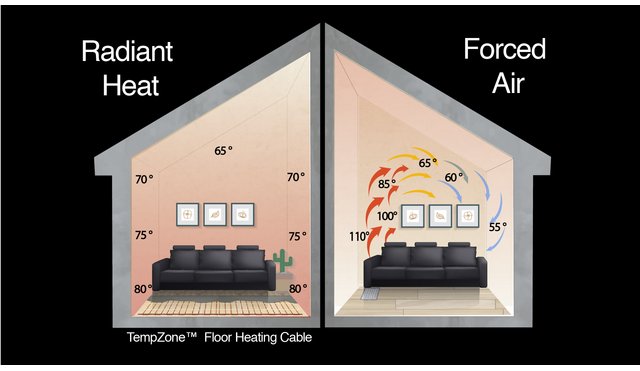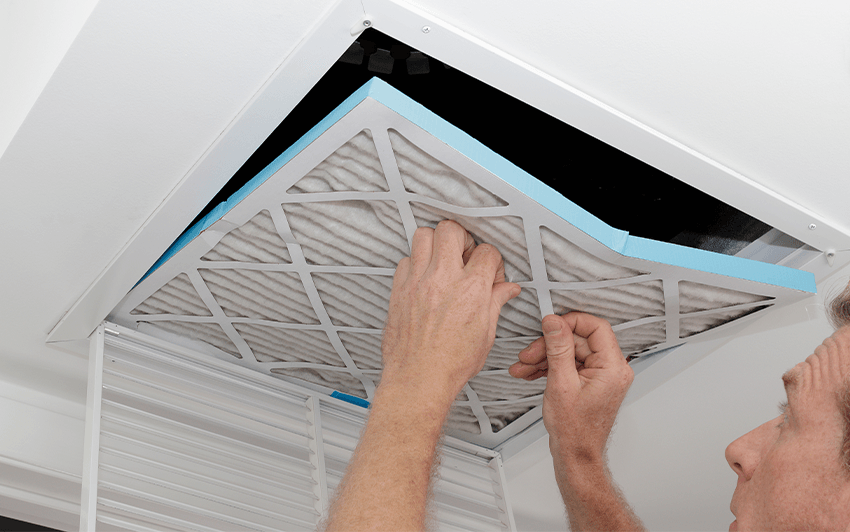Baseboard heating radiates heat from units along the baseboard, commonly found in older homes for its affordability and ductless installation. Forced air heating is more energy efficient as it quickly fills a room with hot air, leading to lower fuel consumption.
In terms of energy efficiency, forced air systems have an edge over baseboard heaters due to their rapid heating capability and air circulation throughout a home. Baseboard heaters, though cost-effective initially, might lead to higher utility bills and safety hazards like potential fire risks if not maintained properly.
Understanding the differences and advantages of these heating systems is essential for homeowners looking to optimize their energy usage and comfort levels.

Credit: www.warmlyyours.com
Understanding Baseboard Heat
Baseboard heating radiates heat from units placed along the baseboard, commonly in older homes below windows.
- Advantages: Less expensive to install, no need for ducts in floors or walls.
- Disadvantages: Higher utility bills than forced air, can become a safety hazard if not maintained properly.

Credit: www.napoleon.com
Insight Into Forced Air Heating
Baseboard heating, which works by radiating heat from units placed along the baseboard of a room, is a cost-effective option found in older homes. In comparison, forced air heating is more energy efficient, filling a room with hot air quickly and using less fuel.
Both have their advantages and disadvantages, so it’s worth considering which is better suited for your home.
Functionality
Forced air heating operates by distributing warm air through ducts installed throughout your home.
Comparison With Baseboard Heat
Forced air heating is more energy efficient than baseboard heating due to its ability to quickly fill a room with hot air.
Efficiency Comparison
When comparing efficiency between baseboard heat and forced air, forced air heating is found to be much more energy efficient. It heats up a room more quickly and uses less fuel, making it a more efficient source of heating. Conversely, baseboard heating can be more expensive to operate and poses safety hazards if not properly maintained.
Energy Consumption
Forced air systems are much more energy efficient compared to baseboard heating. They can quickly fill a room with hot air, thus utilizing less of the fuel source, making them a more efficient choice in terms of energy consumption.
Cost Analysis
- Forced air heating is generally more cost-effective in terms of energy consumption due to its ability to efficiently and quickly heat a room
- Electric baseboard heaters, on the other hand, can lead to higher utility bills compared to forced air systems
- When it comes to initial installation costs, baseboard heating is less expensive compared to installing a forced air system

Credit: www.napoleon.com
Considerations For Choosing The Right System
When it comes to heating your property, choosing between baseboard heat and forced air can be a crucial decision. Both systems have their advantages and disadvantages, so it’s essential to consider a few key factors before making a choice. In this section, we will discuss three major considerations to help you determine which system is right for your property.
Property Type
The type of property you own plays a significant role in determining the most suitable heating system. Baseboard heat is commonly found in older homes that lack ducts in the floors or walls. It works by radiating heat from small units placed along the baseboard of each room, usually below the windows. On the other hand, forced air systems are more commonly found in newer homes with central air conditioning. They work by blowing hot air through a network of ducts, providing consistent warmth throughout the entire property. Ultimately, your property’s age and existing infrastructure will heavily influence the choice between baseboard heat and forced air.
Maintenance And Safety
Maintenance and safety are vital factors to consider when choosing a heating system. Electric baseboard heaters, although less expensive to install, can become a safety hazard if not properly maintained. They have the potential to become extremely hot, posing a fire risk. It’s crucial to keep furniture and curtains at least six inches away from these heaters to prevent any accidents. On the other hand, forced air systems require regular maintenance, such as filter replacements and duct cleaning, to ensure optimal performance. However, because they don’t become as hot as baseboard heaters, they generally pose a lower risk of fire hazards.
Energy Efficiency
Energy efficiency is a crucial consideration, as heating and cooling make up a significant portion of a property’s energy consumption. Forced air systems are generally more energy efficient than baseboard heat. They can fill a room with hot air more quickly, using less of the fuel source. This efficiency can result in lower utility bills compared to baseboard heat. However, it’s worth noting that insulated baseboard systems can still provide sufficient warmth without leading to substantial energy losses.
Table: A comparison of property types, maintenance and safety, and energy efficiency for baseboard heat and forced air systems.
| Consideration | Baseboard Heat | Forced Air |
|---|---|---|
| Property Type | More common in older homes | More common in newer homes |
| Maintenance and Safety | Requires proper maintenance to prevent fire hazards | Regular maintenance required, but lower fire risk |
| Energy Efficiency | Less energy efficient compared to forced air | More energy efficient, resulting in lower utility bills |
Choosing between baseboard heat and forced air requires careful consideration of these factors. Evaluating your property type, maintenance requirements, and desired energy efficiency will help you make an informed decision. Remember to also consult with heating professionals who can provide personalized advice based on your specific needs and circumstances.
Frequently Asked Questions Of Baseboard Heat Vs Forced Air
Is Baseboard Heating Cheaper Than Forced Air?
Baseboard heating is generally cheaper than forced air as it does not require ducts for installation.
Should I Replace Baseboard Heat With Forced Air?
For energy efficiency, consider replacing baseboard heat with forced air as it is more efficient.
What Are The Disadvantages Of Baseboard Heaters?
Baseboard heaters can lead to higher utility bills compared to forced air systems. They can become a safety hazard if not properly maintained. Electric baseboard heaters can get very hot and may pose a fire risk. It is essential to keep furniture and curtains at a safe distance.
Is Baseboard Heating Outdated?
Baseboard heating is not outdated. It is commonly found in older homes and is less expensive to install compared to forced air systems. Baseboard heating works by radiating heat from units along the baseboard and does not require ducts in the floors or walls.
Is Baseboard Heating Cheaper Than Forced Air?
Baseboard heating works by radiating heat from small units placed along the baseboard. It is less expensive to install than forced air systems.
Conclusion
Overall, the decision between baseboard heat and forced air systems depends on your specific heating needs, budget, and preferences. Baseboard heating is cost-effective and works well in smaller spaces, while forced air provides efficient heating for larger areas. Consider the energy efficiency, installation costs, and maintenance requirements of each system before making a decision for your home.